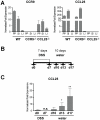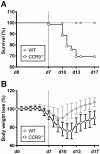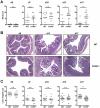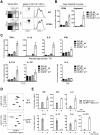CCL25/CCR9 interactions regulate large intestinal inflammation in a murine model of acute colitis
- PMID: 21283540
- PMCID: PMC3026821
- DOI: 10.1371/journal.pone.0016442
CCL25/CCR9 interactions regulate large intestinal inflammation in a murine model of acute colitis
Abstract
Background aims: CCL25/CCR9 is a non-promiscuous chemokine/receptor pair and a key regulator of leukocyte migration to the small intestine. We investigated here whether CCL25/CCR9 interactions also play a role in the regulation of inflammatory responses in the large intestine.
Methods: Acute inflammation and recovery in wild-type (WT) and CCR9(-/-) mice was studied in a model of dextran sulfate sodium (DSS)-induced colitis. Distribution studies and phenotypic characterization of dendritic cell subsets and macrophage were performed by flow cytometry. Inflammatory bowel disease (IBD) scores were assessed and expression of inflammatory cytokines was studied at the mRNA and the protein level.
Results: CCL25 and CCR9 are both expressed in the large intestine and are upregulated during DSS colitis. CCR9(-/-) mice are more susceptible to DSS colitis than WT littermate controls as shown by higher mortality, increased IBD score and delayed recovery. During recovery, the CCR9(-/-) colonic mucosa is characterized by the accumulation of activated macrophages and elevated levels of Th1/Th17 inflammatory cytokines. Activated plasmacytoid dendritic cells (DCs) accumulate in mesenteric lymph nodes (MLNs) of CCR9(-/-) animals, altering the local ratio of DC subsets. Upon re-stimulation, T cells isolated from these MLNs secrete significantly higher levels of TNFα, IFNγ, IL2, IL-6 and IL-17A while down modulating IL-10 production.
Conclusions: Our results demonstrate that CCL25/CCR9 interactions regulate inflammatory immune responses in the large intestinal mucosa by balancing different subsets of dendritic cells. These findings have important implications for the use of CCR9-inhibitors in therapy of human IBD as they indicate a potential risk for patients with large intestinal inflammation.
Conflict of interest statement
Figures






References
-
- Vicari AP, Figueroa DJ, Hedrick JA, Foster JS, Singh KP, et al. TECK: a novel CC chemokine specifically expressed by thymic dendritic cells and potentially involved in T cell development. Immunity. 1997;7:291–301. - PubMed
-
- Papadakis KA, Prehn J, Nelson V, Cheng L, Binder SW, et al. The role of thymus-expressed chemokine and its receptor CCR9 on lymphocytes in the regional specialization of the mucosal immune system. J Immunol. 2000;165:5069–5076. - PubMed
-
- Wurbel MA, Philippe JM, Nguyen C, Victorero G, Freeman T, et al. The chemokine TECK is expressed by thymic and intestinal epithelial cells and attracts double- and single-positive thymocytes expressing the TECK receptor CCR9. Eur J Immunol. 2000;30:262–271. - PubMed
-
- Mora JR, Bono MR, Manjunath N, Weninger W, Cavanagh LL, et al. Selective imprinting of gut-homing T cells by Peyer's patch dendritic cells. Nature. 2003;424:88–93. - PubMed
Publication types
MeSH terms
Substances
Grants and funding
LinkOut - more resources
Full Text Sources
Molecular Biology Databases

